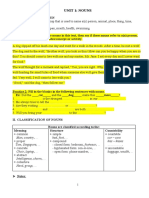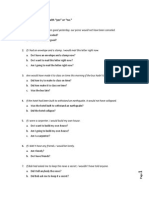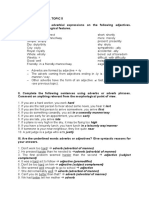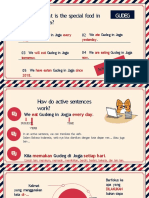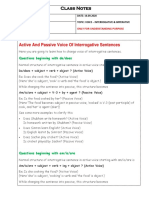Practice Material. Topic 3 I. Comment On These Noun Compounds, According To Quirk and Greenbaum's Model
Practice Material. Topic 3 I. Comment On These Noun Compounds, According To Quirk and Greenbaum's Model
Uploaded by
Galo2142Copyright:
Available Formats
Practice Material. Topic 3 I. Comment On These Noun Compounds, According To Quirk and Greenbaum's Model
Practice Material. Topic 3 I. Comment On These Noun Compounds, According To Quirk and Greenbaum's Model
Uploaded by
Galo2142Original Description:
Original Title
Copyright
Available Formats
Share this document
Did you find this document useful?
Is this content inappropriate?
Copyright:
Available Formats
Practice Material. Topic 3 I. Comment On These Noun Compounds, According To Quirk and Greenbaum's Model
Practice Material. Topic 3 I. Comment On These Noun Compounds, According To Quirk and Greenbaum's Model
Uploaded by
Galo2142Copyright:
Available Formats
PRACTICE MATERIAL.
TOPIC 3
I. Comment on these noun compounds, according to Quirk and Greenbaum's
model.
SEMANTIC MORPHOLOGY SYNTAX MEANING
CLASSIFICATION
birdcage Endocentric N+N Verbless Jaula
blackboard Endocentric Adj + N Verbless Pizarra
bus driver Endocentric N+N V+ O Conductor de
bus
egghead Exocentric N+N Verbless Empollon
frying pan Endocentric V+N V+O Sarten
gamekeeper
birdbrain
highbrow
theatre-goer
watchdog
butterfingers
loudmouth
redcap
paperback
bluebell
II. Complete the following sentences with the corresponding noun derived
from the word in brackets.
1. She’s training to be a ………………………… (beauty)
2. The person a cheque is made out to is called the ………………………… (pay)
3. I am full of …………………………. for what she has achieved. (admire)
4. His parents gave him a lot of …………………………. in his studies
(encourage)
5. It is a ………………………… to say he did it when you know he didn’t. (false)
6. Please, put me two …………………………. of sugar. (spoon)
7. The thing I hate about him is his …………………………. (reliable)
8. We’re going to the first of the two ………………………… (perform)
9. To buy this car I made a monthly …………………………. of 400 euros for two
years. (pay)
10. Fortunately, …………………………. no longer exists in our society. (slave)
III. Give an adequate partitive or specific counter for the following uncountable
nouns:
A ……………………………………… of anger A
……………………………………… of laughter
A ……………………………………… of ammunition A
……………………………………… of thunder
A ……………………………………… of coal A
……………………………………… of wood
A ……………………………………… of air A
……………………………………… of gunfire
A ……………………………………… of meat A
……………………………………… of snow
A ……………………………………… of furniture A
……………………………………… of chalk
A ……………………………………… of news A
……………………………………… of dust
A ……………………………………… of soap A
……………………………………… of luck
A ……………………………………… of applause A
……………………………………… of toast
A ……………………………………… of advice A
……………………………………… of wind
IV. What is the collective noun corresponding to the following?
1. A ………………………… of wolves.
2. A ………………………… of whales.
3. A ………………………… of bees.
4. A ………………………… of puppies.
5. A ………………………… of teachers.
6. A ………………………… of fish.
7. A ………………………… of chickens.
8. A ………………………… of birds.
9. A ………………………… of goats.
10. A ………………………… of singers.
V. Make a comment on each of these words with regard to the number
category. Check the pronunciation and spelling of the plural form.
1. Goose: mutation (change of the medial vowel) geese
2. Memorandum: Irregular/ Latin nouns ending in –um > plural with –a
memoranda. Also regular number memorandums
3. Police: Plural invariable noun/ unmarked plural
4. Mumps: singular invariable noun (disease)
5. Clothes: Plural invariable noun/ Pluralia tantum
6. Wolf: Variable noun/ Irregular / Voicing (nouns ending in –f(e) > -ves wolves
7. Criterion: irregular/ Greek nouns ending in -on > plural with –a criteria
8. Sheep: variable noun/ zero plural (both for singular and plural)
9. Phenomenon: irregular/ Greek nouns ending in –on > plural with –a
phenomena
10. Erratum: irregular/ Latin nouns ending in –um > plural with –a errata
11. Darts: singular invariable noun (game)
12. Shorts: plural invariable noun (dress)
13. Tooth: irregular variable noun/ mutation (change of the medial vowel) teeth
14. Suspenders: binary, / plural invariable noun (dress)
15. Scissors: binary noun /plural invariable Noun (Tools)
16. Deer: variable noun/ zero plural (both for singular and plural)
17. Measles: singular invariable noun (disease)
18. Thief: irregular variable noun/ Voicing (nouns ends in –f(e) > -ves thieves
19. Clergy (police)[clero]: plural invariable noun/ unmarked // -y > -ies clergies
20. Cod: iiregular variable noun/ zero plural (both for singular and plural)
VI. Put the words in brackets into the sentences, in the same order, in their
plural forms. Say the type of plural they exemplify.
1. A large number of mice fled in fear when a flock of geese suddenly landed within
a few feet of them. (mouse, goose, foot) Mutation: change of the medial vowel
2. Automobile companies have all too many stories of delays in deliveries of the
special security keys and are considering ways of manufacturing their own.
(company, story, delay, delivery, key, way) variable nouns/ Treatment of final –
y: -ies when preceding by a consonant. If the way is preceded by a vowel –s
3. Security chiefs believe the thieves climbed along the roofs of several houses
before forcing open an upper window of the office building with knives and escaping
with the contents of two safes (chief, thief, roof, knife, safe) Nouns in –f(e) > –
ves. Voicing.
4. With the help of old photos, war-time Paris was recreated in the film studios for
the film 'echoes of War', in which all the heroes were played by unknown actors.
(photo, studio, echo, hero) regular nouns ending in –o (when the –o is
preceded by a vowel > –s; when the –o is preceded by a consonant > es)
5. Passers-by were surprised when no fewer than six commanders-in-chief in full
uniform, carrying brief-cases, arrived in police cars to attend a series of courts-
martial (passer-by, commander-in-chief, brief-case, police car, court-martial)
plural in compound nouns (some plural in the last element; some other in the
first element when the compound is not appositional)
6. The deer and sheep in the park are sometimes alarmed by low-flying aircraft
(deer, sheep, aircraft) zero plural
VII. Concord: Put the verbs in brackets into the correct form of the present
simple. Justify your choice.
1. Our livestock are not (not to be) as numerous as they used to be. (unmarked
plural)
2. People always tell (to tell) me that mumps is (to be) something for a man to
avoid, since the consequences can be serious.
3. Vermin cause (to cause) diseases.
4. The police are trying (to be trying) to contact the dying woman’s son.
5. The clergy dress (to dress) differently from laymen.
6. Darts is (to be) a very popular game in British pubs.
7. Mathematics seems (to seem) difficult at first sight.
8. Some people think (to think) that politics is (to be) the art of the impossible.
VIII. Write either the masculine or the feminine of the following words and say
how gender is expressed in each case:
1. Buck: Doe different word (morphologically unmarked for gender)
2. Niece: nephew different word (morphologically unmarked for gender)
3. Widow: widower Gender suffix (morphologically marked for gender)
4. Landlady: landlord different word (morphologically unmarked for gender)
5. Host: hosts personal dual gender (who he/she coreference)
6. Witch: wizard different word (morphologically unmarked for gender)
7. Teacher: (=) personal dual gender also called common gender (who
he/she coreference)
8. prince: princess Gender suffix (morphologically marked for gender)
9. monk: nun different word (morphologically unmarked for gender)
10. queen: king different word (morphologically unmarked for gender)
11. bachelor: maid/spinster different word (morphologically unmarked for
gender)
12. friend: (=) personal dual gender (who he/she coreference)
IX. Comment on the difference between the following pairs.
1. A tea-cup / A cup of tea
- A tea-cup: a cup for drinking tea
- A cup of tea: a drink
2. Peter’s and Jane’s cars / Peter and Jane’s cars
- Peter’s and Jane’s cars: each one has their own car
- Peter and jane’s cars: cars that both have
3. A furniture van / A van of furniture
- A furniture van: a van used for carry furniture (or whatever)
- A van of furniture: a van with furniture (not necessary used for
furniture)
4. A cargo boat / The cargo of a boat
- A cargo boat: kind of boat
- The cargo of a boat: load of the boat
5. A pay-day / A day’s pay
- A pay-day: when you receive money
- A day’s pay: amount of money you receive of one day of work
6. Day-time / A day’s time
- Day-time: when during the day (not night)
- A day’s time: 24 hours of the day
7. The rush hour / An hour’s rush
- The rush hour:
- An hour’s rush:
8. Your brother’s e-mail / An e-mail from your brother.
- Your brother’s e-mail
- An e-mail from your borther
You might also like
- THE APPROACH BLUEPRINT - The Ultimate Guide To Approaching WomenDocument30 pagesTHE APPROACH BLUEPRINT - The Ultimate Guide To Approaching WomenLeviNo ratings yet
- Passive Practice 2Document5 pagesPassive Practice 2manhtuan15a0% (4)
- شيت مدرسة الرسالة Oxford Discover 6 (1-9)Document146 pagesشيت مدرسة الرسالة Oxford Discover 6 (1-9)Ahmed Abdallah85% (13)
- Grammar File IDocument163 pagesGrammar File IIvan Dujlovic0% (1)
- Практические заданияDocument5 pagesПрактические заданияzhannatagabergen2606No ratings yet
- The Noun NewDocument3 pagesThe Noun NewLalitheNo ratings yet
- (3) English Zone 6 First Term Revision 3 جروب ابناؤنا فى الخارج #ام - مصريةDocument8 pages(3) English Zone 6 First Term Revision 3 جروب ابناؤنا فى الخارج #ام - مصريةAli KamelNo ratings yet
- Practice Material. Topic 3 I. Comment On These Noun Compounds, According To Quirk and Greenbaum's ModelDocument6 pagesPractice Material. Topic 3 I. Comment On These Noun Compounds, According To Quirk and Greenbaum's ModelGalo2142No ratings yet
- Handout - Unit 1-Nouns - Week 1-3 - 2022Document13 pagesHandout - Unit 1-Nouns - Week 1-3 - 2022Son LeNo ratings yet
- Module 1. Lesson 2Document8 pagesModule 1. Lesson 2Лиза ВырищинскаяNo ratings yet
- Unit 4 - Have Got - PluralsDocument2 pagesUnit 4 - Have Got - PluralsAna Oteo JuradoNo ratings yet
- Linguistics I - Extra 2: A. Phonetics & PhonologyDocument7 pagesLinguistics I - Extra 2: A. Phonetics & Phonologynguyễn thu thủyNo ratings yet
- Sing PluralDocument8 pagesSing Pluralperseus_1No ratings yet
- Choose The Correct Variant (6 Points)Document3 pagesChoose The Correct Variant (6 Points)АльбинаNo ratings yet
- The Use of ArticlesDocument19 pagesThe Use of Articlesavril55No ratings yet
- NMGR 1obor Aj PPPDocument25 pagesNMGR 1obor Aj PPPlenguyenuyennhi2112No ratings yet
- Revision Unit 1 Exploring The PastDocument19 pagesRevision Unit 1 Exploring The PastSAID LADJEDELNo ratings yet
- Class 6Document4 pagesClass 6adnankhan1234999No ratings yet
- Junior a ΑσκησειςDocument8 pagesJunior a ΑσκησειςSotiria Pl50% (2)
- Written Assignment #2 Nouns Number 2024Document8 pagesWritten Assignment #2 Nouns Number 2024lucaseaguilar34No ratings yet
- EngDocument34 pagesEngdurgeshtiwaryNo ratings yet
- ExercisesDocument7 pagesExercisesElbah ElhouNo ratings yet
- اختبارات تحديد مستوي جميع المراحل - 2Document12 pagesاختبارات تحديد مستوي جميع المراحل - 2ahmedelzalat19944No ratings yet
- English (NOUNS & PRONOUNS) With AnswersDocument14 pagesEnglish (NOUNS & PRONOUNS) With Answersiam.aala202No ratings yet
- Get Ready For IELTSDocument16 pagesGet Ready For IELTSJOKER JOKERNo ratings yet
- 7. Final RevisionDocument10 pages7. Final Revisionmr.elmowafyNo ratings yet
- Revision Test - Grammar 1Document8 pagesRevision Test - Grammar 1FlorenciaNo ratings yet
- Q3 Worksheet 2Document8 pagesQ3 Worksheet 2anasabohloNo ratings yet
- ConditionalsDocument14 pagesConditionalsAli GhahremanNo ratings yet
- Polysemy: School. 5) What You Think About This Probably Depends On Which School ofDocument4 pagesPolysemy: School. 5) What You Think About This Probably Depends On Which School ofВалерия ЛитвиноваNo ratings yet
- Grade 04 English 3rd Term Test Paper 2014 English Medium - Zahira CollegeDocument6 pagesGrade 04 English 3rd Term Test Paper 2014 English Medium - Zahira CollegeBanu SuganjaNo ratings yet
- English Morphology Workbook: Costin - Valentin OanceaDocument92 pagesEnglish Morphology Workbook: Costin - Valentin OanceaLuisNo ratings yet
- Note and Exercisess On Singuular and Plural of NounsDocument6 pagesNote and Exercisess On Singuular and Plural of NounsMohamadu DickoNo ratings yet
- Fill in The Blanks With The Correct Form of The VerbsDocument4 pagesFill in The Blanks With The Correct Form of The VerbsJacob WangNo ratings yet
- Class X AllDocument30 pagesClass X Allnikhil9437345No ratings yet
- Basic Sentence PatternDocument57 pagesBasic Sentence PatternSmarty Town100% (1)
- English 4 - Week 4 Review Unit 8Document5 pagesEnglish 4 - Week 4 Review Unit 8phuctq2001No ratings yet
- English Idioms Work SheetsDocument10 pagesEnglish Idioms Work Sheetskrempi89No ratings yet
- Are Is Is Is Is Are Are Is: I-Regular PluralsDocument3 pagesAre Is Is Is Is Are Are Is: I-Regular PluralsLaurenne YaoNo ratings yet
- Revision - VocabularyDocument4 pagesRevision - VocabularyMaryam RagabNo ratings yet
- Engleza ExercitiiDocument89 pagesEngleza ExercitiiCalin OpreaNo ratings yet
- Unit 1 - Nouns - Updated - 07-12-2023 - HandoutDocument16 pagesUnit 1 - Nouns - Updated - 07-12-2023 - HandoutBinh PhamNo ratings yet
- English Vocabulary Exercises For A2 Gadgets English Practice OnlineDocument1 pageEnglish Vocabulary Exercises For A2 Gadgets English Practice Onlinemarinka frizNo ratings yet
- مراجعة الوحدة الثالثة اسئلة1Document5 pagesمراجعة الوحدة الثالثة اسئلة1AMIRA HELAYELNo ratings yet
- NewEngInUse4 EP 3-2Document2 pagesNewEngInUse4 EP 3-2Antonio González VaraNo ratings yet
- Handout - Unit 1-Nouns - Week 1-3Document14 pagesHandout - Unit 1-Nouns - Week 1-3ng.anh2512No ratings yet
- نماذج امتحانات تحديد مستوى اللغة الانجلزية مستر حسام عبد اللهDocument10 pagesنماذج امتحانات تحديد مستوى اللغة الانجلزية مستر حسام عبد اللهSameh IbrahimNo ratings yet
- CH 7 SolutionsDocument5 pagesCH 7 SolutionsItu DeyNo ratings yet
- 9th Prose 1 Book Back ExercieDocument19 pages9th Prose 1 Book Back ExercieAnusuya.N PVBMNo ratings yet
- Family and Friends 5 Booklet 1st Term مذكرة الصف الخامس مراجعة2015من مدونة نهضة مصر التعليميةDocument75 pagesFamily and Friends 5 Booklet 1st Term مذكرة الصف الخامس مراجعة2015من مدونة نهضة مصر التعليميةEman JjNo ratings yet
- Ilovepdf MergedDocument10 pagesIlovepdf MergedElio MauricioNo ratings yet
- A. Are These Sentences True or False? Correct The False SentencesDocument4 pagesA. Are These Sentences True or False? Correct The False SentencesIrina SerseaNo ratings yet
- Exercise TryDocument10 pagesExercise Trynediva fadiaNo ratings yet
- Revision-Grade 8 - 231224 - 111521Document10 pagesRevision-Grade 8 - 231224 - 111521Devika DissanayakaNo ratings yet
- Unit 7Document27 pagesUnit 7hoangredstoneNo ratings yet
- g3 3rd Quarter Revision SheetsDocument15 pagesg3 3rd Quarter Revision Sheetsbooklets.2023No ratings yet
- Story WritingDocument5 pagesStory Writingcortland99No ratings yet
- Final Revision - Extra ExerciseDocument5 pagesFinal Revision - Extra ExerciseBucky MonkeyNo ratings yet
- A Massive Book Full of FECKIN' IRISH SLANG that's Great Craic for Any Shower of SavagesFrom EverandA Massive Book Full of FECKIN' IRISH SLANG that's Great Craic for Any Shower of SavagesNo ratings yet
- Synchronize3 Grammarreference SpanishDocument10 pagesSynchronize3 Grammarreference SpanishGalo2142No ratings yet
- Técnicas de Estudio y Análisis en Literatura Ingles Exam 3 Dpto. de Filología InglesaDocument8 pagesTécnicas de Estudio y Análisis en Literatura Ingles Exam 3 Dpto. de Filología InglesaGalo2142No ratings yet
- I. Anwer The Following Brief QuestionsDocument6 pagesI. Anwer The Following Brief QuestionsGalo2142No ratings yet
- And Prejudice, For Instance) Still Be Considered Literary TextsDocument7 pagesAnd Prejudice, For Instance) Still Be Considered Literary TextsGalo2142No ratings yet
- Belles Lettres, I.e., A Text Which Is Aesthetic, I.e., Which Creates Beauty and ProvokesDocument9 pagesBelles Lettres, I.e., A Text Which Is Aesthetic, I.e., Which Creates Beauty and ProvokesGalo2142No ratings yet
- Set ReadingsDocument1 pageSet ReadingsGalo2142No ratings yet
- Set ReadingsDocument1 pageSet ReadingsGalo2142No ratings yet
- Practice - Topic 2Document10 pagesPractice - Topic 2Galo2142No ratings yet
- T A - S R:: Hree Nglo Axon IddlesDocument1 pageT A - S R:: Hree Nglo Axon IddlesGalo2142No ratings yet
- Set ReadingsDocument1 pageSet ReadingsGalo2142No ratings yet
- Catenative VerbsDocument4 pagesCatenative VerbsGalo2142No ratings yet
- The Wanderer: Show Text Without Translation Show Word Order Translation Guides Change Verse Line NumberingDocument6 pagesThe Wanderer: Show Text Without Translation Show Word Order Translation Guides Change Verse Line NumberingGalo2142No ratings yet
- Beowulf Part 1 24pl0joDocument29 pagesBeowulf Part 1 24pl0joGalo2142No ratings yet
- Most Forceful Figure in British PoliticsDocument4 pagesMost Forceful Figure in British PoliticsGalo2142No ratings yet
- Beowulf List of Characters PDFDocument2 pagesBeowulf List of Characters PDFGalo2142No ratings yet
- Manner / Way.: Complement)Document3 pagesManner / Way.: Complement)Galo2142No ratings yet
- English Grammar: Syntax and Semantics Sample Text, Topic 3Document1 pageEnglish Grammar: Syntax and Semantics Sample Text, Topic 3Galo2142No ratings yet
- Deletion of Final - e : Stem BaseDocument5 pagesDeletion of Final - e : Stem BaseGalo2142No ratings yet
- Foreign Terms and Otherness A Case Study of The Joy Luck Club and Its Chinese and Japanese TranslationsDocument25 pagesForeign Terms and Otherness A Case Study of The Joy Luck Club and Its Chinese and Japanese TranslationsGalo2142No ratings yet
- "We Are Seven" by William WordsworthDocument1 page"We Are Seven" by William WordsworthGalo2142No ratings yet
- 19 B THE ROMANTIC PERIOD First GenerationDocument6 pages19 B THE ROMANTIC PERIOD First GenerationGalo2142No ratings yet
- Augustan PoetryDocument4 pagesAugustan PoetryGalo2142No ratings yet
- Introduction To The Sonnet and WyattDocument24 pagesIntroduction To The Sonnet and WyattGalo2142No ratings yet
- Vocabulary Unit 9 Zakir 2nd YrDocument2 pagesVocabulary Unit 9 Zakir 2nd YrAurobind Yadav AuroraNo ratings yet
- Academy Stars 5 WorkbookDocument10 pagesAcademy Stars 5 Workbooksereen AlawnehNo ratings yet
- Spells 33 and 423 From The Pyramid Texts: Translation and CommentaryDocument18 pagesSpells 33 and 423 From The Pyramid Texts: Translation and CommentarySjef WillockxNo ratings yet
- Buku Text f5 BiDocument188 pagesBuku Text f5 BiRosli MohdNo ratings yet
- Silabus Mata Kuliah Bahasa InggrisDocument8 pagesSilabus Mata Kuliah Bahasa InggrisKang HarjhoNo ratings yet
- wk3 Bics and CalpDocument59 pageswk3 Bics and CalpAngel Florence V. VillareNo ratings yet
- Verbos IrregularesDocument6 pagesVerbos Irregulares170300355No ratings yet
- Questation Paper English Class 5Document2 pagesQuestation Paper English Class 5imthebatmanofcodmNo ratings yet
- Class V - Eng - Module 5 - Day 5 - Parts of SpeechDocument5 pagesClass V - Eng - Module 5 - Day 5 - Parts of SpeechSrinivasa Reddy KarriNo ratings yet
- Soal Bhs Inggris Kelas 11Document9 pagesSoal Bhs Inggris Kelas 11mallaNo ratings yet
- 3RD Grading EnglishDocument17 pages3RD Grading EnglishJohannah Eleiya CalimagNo ratings yet
- Modern Greek 1: Reading BookletDocument28 pagesModern Greek 1: Reading BookletcelsoNo ratings yet
- DISS - Week 3 EditedDocument11 pagesDISS - Week 3 Editedlucerojasper8No ratings yet
- Paradise Education Cetre Series Paper English Language Form 4 Time 3:00 Hours 3/11/2021 InstructionsDocument8 pagesParadise Education Cetre Series Paper English Language Form 4 Time 3:00 Hours 3/11/2021 InstructionsJOHNNo ratings yet
- What Is The Special Food in Jogja?: GudegDocument8 pagesWhat Is The Special Food in Jogja?: GudegSalmaa AbdillahNo ratings yet
- Lesson 102Document1 pageLesson 102Hafiz AbdullahNo ratings yet
- Class Notes: Active and Passive Voice of Interrogative SentencesDocument8 pagesClass Notes: Active and Passive Voice of Interrogative SentencesMitrasenNo ratings yet
- Au t2 e 3911 Year 3 Narrative Adventure Structure and Language Features Example Text EnglishDocument8 pagesAu t2 e 3911 Year 3 Narrative Adventure Structure and Language Features Example Text EnglishsmartnessprsnfdNo ratings yet
- SS Latihan Song KelasDocument2 pagesSS Latihan Song KelasDeo anggara PutraNo ratings yet
- Newbie S1 #3 What's Your Name?: Lesson NotesDocument6 pagesNewbie S1 #3 What's Your Name?: Lesson NotesminoasNo ratings yet
- Nisha - KL CVDocument2 pagesNisha - KL CVNisha SinhaNo ratings yet
- Allophonic Processes According To Each PhonemDocument4 pagesAllophonic Processes According To Each PhonemStefanía MoserNo ratings yet
- Schedule - Updated On 23.01.2023Document3 pagesSchedule - Updated On 23.01.2023جعفر يايوشNo ratings yet
- Professional Language ChoicesDocument23 pagesProfessional Language ChoicesMariel Anne JulaoNo ratings yet
- Body Language PDFDocument4 pagesBody Language PDFmariamusumeciNo ratings yet
- Excuse Letter Convo6Document3 pagesExcuse Letter Convo6Abiekhay Camillee Unson LavastidaNo ratings yet
- Test-Taking Strategies - Common Questions: Multiple Choice ExamsDocument7 pagesTest-Taking Strategies - Common Questions: Multiple Choice ExamsNew life2.0No ratings yet
- LIBRODocument55 pagesLIBROZL Dan ZLNo ratings yet
- Lecture 2 LTMA PDFDocument4 pagesLecture 2 LTMA PDFimene IBNo ratings yet








